
Star of the Month: Grace KellyGreat, great month on Turner, not the least of which is the cable channel's pick of Grace Kelly as its Star of the Month. Princess Grace made only eleven - count 'em - eleven feature films and she never overacted or chewed at scenery to command attention. She did it quietly - with muted style and serenity. The rest of the month ain't bad either, including an on-going tribute to composer Johnny Mercer. Here are a few highlights...

Jack capers in Quine's "How to Murder Your Wife""How To Murder Your Wife" - airing at noon (est) on Sunday, 1 November - may be the least of the six features that Jack Lemmon made with Richard Quine but it's alert fun nevertheless. Part of the problem is that it's hard to buy Jack as a womanizing playboy and man-about-town - the town being New York, no less. But Jack pretty much turns the screen over to his game co-star Virna Lisi and an array of grateful supporting players - Terry-Thomas (barely concealing his homoeroticism as Jack's "man" - his butler); Eddie Mayhoff (still as wittily pushy as when he gave Jerry Lewis a difficult time); Claire Trevor, giving new meaning to the sexist expression, Battle Axe, and Max Showalter (aka, Casey Adams), Jack Albertson, Alan Hewitt, Mary Wickes and Sidney Blackmer who as a soused arbiter of justice gets to utter the line, "I'm as sober as a judge," courtesy of writer George Axelrod. Given so much talent, I just wish "How to Murder Your Wife" was a better comedy.
Charles Walters' affable military comedy, "Don't Go Near the Water" (1957), is worth catching not only for star Glenn Ford's laid-back charm, but for the breezy obscenity of Mickey Shaughnessy's performance as a soldier who can't control his mouth. Watch it at 6 a.m. (est) on Monday, 2 November. Later in the day, at 2 p.m. (est) you can see Dean Martin is his first post-Jerry role in Richard Thorpe's "Ten Thousand Bedrooms" (1957), co-starring Anna Maria Alberghetti.

Goulet and Kwan stranded at the "Honeymoon Hotel"Henry Levin's "Honeymoon Hotel" (1964) was a misguided attempt to exploit the matinee-idol status of two leading men whose respective careers were each driven by early '60s Broadway musicals. Robert Goulet, a handsome young baritone from Canada, had scored as Lancelot in Lerner and Loewe's 1960 "Camelot," while Robert Morse was the Gotham Golden Boy, thanks to his ambitious puppy in 1961's "How to Succeed in Business Without Really Trying" by Frank Loesser.
Morse had already made his screen debut in 1958 in Joseph Anthony's "The Matchmaker," but "Honeymoon Hotel" was conceived to move him - and Goulet - into star status in a Martin/Lewis-style romp about two horny friends who end up sharing a room at a resort hotel that caters to newlyweds only. And, yes, there's a touch of "Some Like It Hot" here, what with the guys up to their eyes in women they can't touch.
While Morse went on to have a modest film career that peaked with the bland David Swift film version of "How to Succeed in Business Without Really Trying" (1967), Goulet had less success. He had one more leading-man role - in Jack Smight's "I'd Rather Be Rich" (opposite Sandra Dee and Andy Williams) the same year - before seguing into largely TV work, a missed opportunity for an actor both talented and movie-star-ish.
There's not much to say about "Honeymoon Hotel" except that it has a good supporting cast (Jill St. John, Keenan Wynn, Anne Helm, David Lewis, Elsa Lanchester, Elvia Allman, Bernard Fox and Sandra Gould). Charming leading lady Nancy Kwan, meanwhile, is a good sport performing a most bizarre dance (choreographed by Miriam Nelson).
This film was her consolation prize after Ray Stark, the man who discovered her, decided to pass on a film version of Richard Rodgers' "No Strings," that would have reunited Kwan opposite her "World of Suzie Wong" co-star, William Holden. (There was something of a racial fuss at the time because Stark had decided to change the heroine of "No Strings" from Black to Asian, effectively killing plans for the film.)
"Honeymoon Hotel" will be shown at 4 p.m. (est) on Monday, 2 November.

Titles by Saul BassHere are four films worth watching just for their titles sequences alone, designed by the master of all titles artists, Saul Bass. Starting at 8 p.m. on Monday, 2 November, catch Alfred Hitchcock's "Vertigo" (1958) and "North by Northwest" (1959), followed by Otto Preminger's "Anatomy of a Murder" 91959) and "Bunny Lake Is Missing" (1965).

Harris and Dean, young acting giants in Kazan's "East of Eden"Few films have captured the troubling consequences of family life, where love is either withheld or given only grudingly, than Elia Kazan's 1955 film version of John Steinbeck's "East of Eden," a quality that's fully realized by the lovely, careful performances of stars Julie Harris and James Dean. Look for the fabulous Lois Smith in a small role - one of her first parts on film. "East of Eden" plays at 8 p.m. (est) on Tuesday, 3 November.
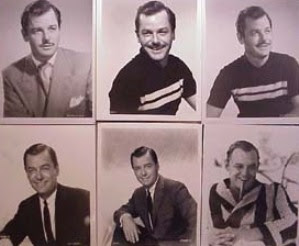 One of the most irresistible screen presences - ever - was the urbane Gig Young, who gets a day of his own on Wednesday, 4 November, when Turner screens eight of his features, starting at 8 a.m. (est) with Vincent Sherman's "Old Acquaintance" (1943), followed by Peter Godfrey's "The Woman in White" (1948), George Archainbaud's "Hunt the Man Down" (1950), Irving Allen's "Slaughter Trail" (1951), Gerald Mayer's "Holiday for Sinners" (1952), Don Weis's "You for Me" (1952), Richard Thorpe's "The Girl Who Had Everything" (1953) and George Sidney's "A Ticklish Affair" (1963), co-starring the two Jones girls - Shirley and Carolyn.
One of the most irresistible screen presences - ever - was the urbane Gig Young, who gets a day of his own on Wednesday, 4 November, when Turner screens eight of his features, starting at 8 a.m. (est) with Vincent Sherman's "Old Acquaintance" (1943), followed by Peter Godfrey's "The Woman in White" (1948), George Archainbaud's "Hunt the Man Down" (1950), Irving Allen's "Slaughter Trail" (1951), Gerald Mayer's "Holiday for Sinners" (1952), Don Weis's "You for Me" (1952), Richard Thorpe's "The Girl Who Had Everything" (1953) and George Sidney's "A Ticklish Affair" (1963), co-starring the two Jones girls - Shirley and Carolyn.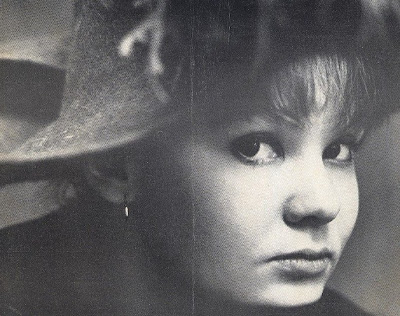
Hitch Hearts HarrisAlfred Hitchcock has been misrepresented by his infamous "Actors are cattle" quip, with most people deducing that he hated actors. Not true. His point: Directing actors is a matter of moving them from here to there, much like cattle. Anyway, Hitch's final film, "Family Plot" (1976), patly disproves this falsehood. If Hitch wasn't completely beguiled by Barbara Harris (that's her above), then I'm misreading the signs of love.
Find out for yourself when Turner airs the film at 10 a.m. (est) on Saturday, 7 November.
Two Times Two Equals Four StarsThe first films of two British director - Ridley Scott's "The Dullists" (1978), starring Keith Carradine and Harvey Keitel, and stephen Frears' "Gumshoe" (1971), with Albert Finney, Billie Whitelaw and Janice Rule - will be shown on Sunday, 8 November, beginning at midnight (est).
The Screen Team That Stopped...For one brief moment in the late 1970s-early '80s, Carl Reiner was an auteur and Steve Martin was his muse. In fact, they made four back-to-back films in five years, starting with "The Jerk" in 1979 and followed by three unusually inventive titles - "Dead Man Don't Wear Plaid" (1982) "The Man With Two Brains" (1983) and "All of Me" (1984). Good stuff. Why they stopped is beyond me. Here's your chance to see "All of Me," co-starring Lily Tomlin, at 4:15 a.m. (est) on Monday, 9 November.
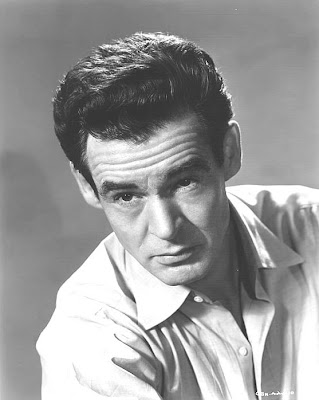 They don't build actors like Robert Ryan anymore (check out that gaze, above), and Turner is intent on proving that with an eight-film tribute that it's scheduled for Tuesday, 10 November, begining at 6 a.m. (est) with Robert Z. Leonard's "Her Twelve Me" (1954). It will be followed by Nicholas Ray's "Born to be Bad" (1950), William D. Russell's "Best of the Badmen" (1951), John Farrow's "Back from Eternity" (1956), John Cromwell's "The Racket" (1851), Ray's "On Dangerous Ground" (1951), Harry Horner's "Beware, My Lovely" (1952) and Fritz Lang's "Clash by Night" (1952), opposite Barbara Stanwyck and Marilyn Monroe.
They don't build actors like Robert Ryan anymore (check out that gaze, above), and Turner is intent on proving that with an eight-film tribute that it's scheduled for Tuesday, 10 November, begining at 6 a.m. (est) with Robert Z. Leonard's "Her Twelve Me" (1954). It will be followed by Nicholas Ray's "Born to be Bad" (1950), William D. Russell's "Best of the Badmen" (1951), John Farrow's "Back from Eternity" (1956), John Cromwell's "The Racket" (1851), Ray's "On Dangerous Ground" (1951), Harry Horner's "Beware, My Lovely" (1952) and Fritz Lang's "Clash by Night" (1952), opposite Barbara Stanwyck and Marilyn Monroe.Here is your chance to savor this champion of the masculine outcast and lost soul who, reluctantly, explored human relationships. And you can get a head start by checking out Ryan in Sam Fuller's terrific "House of Bamboo" (1955) at 8 p.m. (est) on Sunday, 8 November.

Bolstered by cutting edge performances by Stacy Keach, Jeff Bridges and the ultra quirky Susan Tyrell, John Huston's corrosive masterpiece "Fat City" (1972), long overlooked and forgotten, turns conventional Hollywood melodrama on its head as it brings its tale of a washed-up boxer (Keach) mentoring a young hopeful (Bridge) to a creepy pitch that is difficult to shake. Watch it at 4 a.m.(est) on Friday, 13 November.

One of the great movie secrets for the past, oh, fifty years, is that Leslie Caron did not do her own singing in Vincente Minnelli's "Gigi" (1958). Like a few other notable screen musicals stars - Rita Hayworth, Cyd Charisse and Vera-Ellen, all dancers - Caron was traditionally dubbed when it came to singing on-screen, although she did warble the slight title tune that highlighted Charles Walters' "Lili."
For "Gigi," Caron was dubbed by sound-alike Betty Wand who also dubbed Rita Moreno on "A Boy Like That" for "West Side Story." Yes, that's right. While everyone - including Moreno - makes a fuss about Natalie Wood and Richard Beymer being dubbed in WSS, she was, too! (Moreno, who exhibits no love for Wood during her commentary for the DVD of WSS, never addresses her own dubbing.) And so was musical star, Russ Tamblyn, whose singing voice isn't his in the Sondheim-Bernstein vehicle. The voice is actually that of his co-star, Tucker Smith. If none of this makes any sense, blame Saul Chaplin, a film-musical perfectionist who also insisted that Juanita Moore be dubbed in "South Pacific," even though she sang the part of Bloody Mary on stage for years before making the Josh Logan film version.
Anyway, listen closely as Caron sings in "Gigi" at noon (est) on Friday, 13 November.

"O.K. ... L.A. ... H.O. ... M.A. ... Oklahoma! Ya-hoo!"Rogers and Hammerstein's "Oklahoma!" was as revolutionary on screen as it was on stage. This was - to the best of my knowledge - the first major film musical to be helmed by a filmmaker known for more dramatic fare. Comedies - and certainly musicals - were not the forté of the great Fred Zinnemann. (Sidney Lumet, John Huston and Sir Richard Attenborough are three other "serious" filmmakers who would be recruited by the studios to resuscitate the film musical, which fell on hard times in the 1950s and has yet to completely rebound.)
 Zinnemann was craftly. He was scrupulously faithful to the classic stage musical, but cleverly added a couple little curlicues of his own - namely, method player Rod Steiger and noir mainstay Gloria Graham in crucial supporting roles. Not just that. But Zinnemann let them do their own singing. God bless him.
Zinnemann was craftly. He was scrupulously faithful to the classic stage musical, but cleverly added a couple little curlicues of his own - namely, method player Rod Steiger and noir mainstay Gloria Graham in crucial supporting roles. Not just that. But Zinnemann let them do their own singing. God bless him.A fanatical movie-musical lover, I am no purist. I think that casting properly is more important than singing ability - and "Oklahoma!" proves my point. Steiger and Graham are excellent in their roles (Graham cast seemingly against type, but not really) and, while neither is an accomplished singer, I love knowing that it's their voices that are coming out of their mouths - and not the soulless intonations of Marni Nixon, the bane of movie musicals of the 1950s and '60s.
Steiger, in fact, is so good that one regrets that his rendition of "Poor Jud Is Daid" (aka, "Poor Jud Is Dead") with Gordon MacRae was truncated for the film and that Jud's "Lonely Room" number was cut altogether.
"Oklahoma!" (1955) screens 2 p.m. (est) on Saturday, 14 November.
Compare & Contrast: “The Lost and Found RKO Collection”Last December, Turner discovered and dusted off six forgotten classics of the 1930’s RKO studio era.
Two of the titles - "Living on Love" and "A Man to Remember" - were “B” picture remakes of two other titles in the collection - "Rafter Romance" and "One Man’s Journey." I've no idea when the others will pop up for encore presentations, but Lew Landers' "Living on Love" (1937) and William A. Seiter's "Rafter Romance"" (1933) - both about a man and a woman who unknowingly share the same apartment because they work different shifts - will be rescreened by Turner on consecutive days.
"Living on Love," with Whitney Bourne and James Dunne, airs at 7:15 a.m. (est) on Monday, 16 November; "Rafter Romance," with Ginger Rogers and Norman Foster, at 9 a.m. (est) on Tuesday, 17 November.

Why on earth was this film admired?Look, I like Jack Lemmon. He's my favorite actor. Of all time. And while I should appreciate the attention and acclaim that came to him via Blake Edwards' drama on alcoholism, "Days of Wine and Roses" (1962), I don't necessarily like the film or Jack's performance in it. J.P. Miller's script is painfully simplistic and Jack's melt-down in a greenhouse while looking for booze is cringe-worthy. That said, Lee Remick is fine, the anchor of this wildly overrated movie.
It screens at 2 a.m. on Thursday, 19 November.
Willie Nelson & Fred Schepisi & Alan RudolphOnly Turner would be resouceful enough to devote a night to balladeer Willie Nelson who, in his woefully brief film career, worked for more than a few auteurs - including Schepisi who directed him in the revisionist Western "Barbarosa" (1982) and Rudolph who paired him with Kris Kristofferson in the companionable "Songwrite" (1984). They air back-to-back, starting at 1 a.m. (est) on Friday, 20 November. Enjoy!
Double-Bill on Race Relations
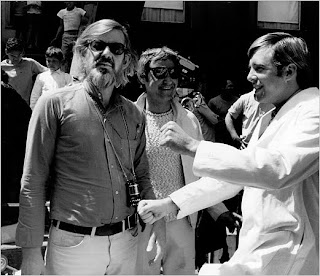 The fascination of human relationships, the perilous nature of interracial love, the seduction of escape and the ideology of family are all dealt without compromise in two excellent features, Larry Peerce's "One Potato, Two Potato" (1964) and Hal Ashby's "The Landlord" (1970), being screened back-to-back Friday, 20 November, starting at 8 p.m. (est).
The fascination of human relationships, the perilous nature of interracial love, the seduction of escape and the ideology of family are all dealt without compromise in two excellent features, Larry Peerce's "One Potato, Two Potato" (1964) and Hal Ashby's "The Landlord" (1970), being screened back-to-back Friday, 20 November, starting at 8 p.m. (est).Barbara Barrie stars in the former as a divorcee whose relationship with a black man (Bernie Hamilton) enrages her former husband (Richard Mulligan), threatening her custody battle, and Beau Bridges (above with director Ashby) has his finest film role as the title star of "The Landlord," about a rich white kid who wants to gentrify a tenement apartment, only to become involved with the black tenants he plans to evicit. The sublime Diana Sands and Oscar-nominated Lee Grant co-star.

Fleischer! Encore! Bravo!The ever underrated Richard Fleischer earns a well-deserved prime-time double bill with back-to-back showings of his tense, smart "Violent Saturday" (1955), starring '50s hunks Victor Mature, Richard Egan and Stephen McNally, and the rough and raw "The Vikings" (1958), which pairs Kirk Douglas with '50s hot couple, Tony Curtis and Janet Leigh, in what amounts to a glorified pirate adventure - albeit a first-rate pirate adventure. Narration by Orson Welles and a memorable music score by Mario Nascimbene add to the adventure of it all.
"Violent Saturday" amd "The Vikings" air back-to-back beginning at 8 p.m. on Sunday, 22 November.

Jean Negulesco's "Road House" (1948)Not to be confused with the 1989 Rowdy Herrington/Patrick Swayze free-for-all, Negulesco's film is something of a minor classic that Richard Widmark made almost immediately after his breakthrough film, Henry Hathaway's "Kiss of Death." Here, Widmark goes into the nighclub business, shady-division, with no less than Ida Lupino as his chanteuse. Ida ings here - a song called "Again." Bliss - even if she does hit a flat note now and then. Again, I prefer to hear actors doing their own singing.
Celeste Holm and Cornel Wilde co-star. "Road House" airs on Turner at 8 p.m. (est) on Qednesday, 25 November.
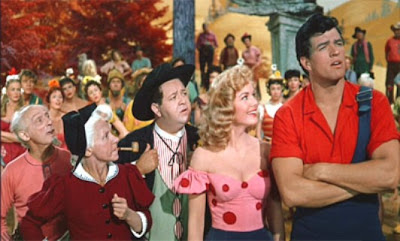
Melvin Frank's "Li'l Abner" (1959)A first-rate musical comedy by Johnny Mercer and Gene De Paul, based on the beloved Al Capp cartoon strip, "Li'l Abner" (1959) was rudely dismissed in its day. But, frankly, it's pretty wonderful, anchored by Michael Kidd's original stage choreography, recreated for the occasion by Dee Dee Wood. Sinatra fave, Nelson Riddle, did the orchestrations.
Oh, yeah, and Jerry Lewis stops by for a cameo.
"Li'l Abner" airs at 11:30 p.m. (est) on Wednesday, 25 November.
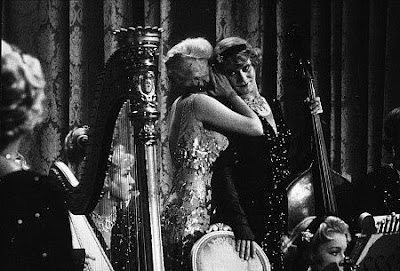
Black Friday: Comedy on Turner -skip footballI see no reason to get out of bed on Friday, 27 November. That's when, starting at 8 a.m. (est) for 12 hours straight, Turner airs Charles Walters' "Please Don't Eat the Daisies" (1960), H.C. Potter's "Mr. Blandings Builds His Dream House" (1948), Melville Shavelson's "Houseboat" (1958) and "Yours Mine and Ours" (1968), Vincente Minnelli's "The Long, Long Trailer" (1954) and Billy Wilder's "Some Like It Hot" (1959). The stars? Cary Grant, Myrna Loy, Sophia Loren, Doris Day, David Niven, Henry Fonda, Lucy and Desi and ... Sugar and Daphne (Marilyn and Jack in the still shot above).
Don Sharp's "Psychomania" (1971)Don't miss this one.
Part Guilty Pleasure, part undiscovered masterpiece, this witty, astute British horror lark mixes bikers with Satanism and is never less than watchable. Nicky Henson, a young Brit hunk who was quite ubiquitous in the early 1970s ("30 Is a Dangerous Age, Cynthia" and "There's a Girl in My Soup"), stars as the reckless hero and, making it further irresistible is the presence of Beryl Reid (that's her, below) and the usually game George Sanders (in what, alas, would be his final film).
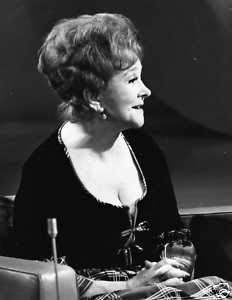
Sharp was a sinfully overlooked filmmaker who will forever be honored here for 1975's top-notch Irish thriller, "Hennessy" starring Rod Steiger, Lee Remick, Trevor Howard and Richard Johnson, and 1979's "Bear Island" with the to-die-for cast of Vanessa Redgrave, Donald Sutherland, Richard Widmark, Barbara Parkins, Chistopher Lee and Lloyd Bridges.
A native of Tasmania, Australia, Sharp seemingly retired from filmmaking in 1989, a few years after having directed Jenny Seagrove and Deborah Kerr in the superior teleplay, "A Woman of Substance" (1984).
"Psychomania" airs at 2 a.m. (est) on Saturday, 28 November. Record it.
James William Guerico's "Electra Glide in Blue" (1973)Very much the counterculture epic of its day, eagerly awaited and ripe for the hero reduction of its Brilliant Young Filmmaker which followed, James William Guerico's "Electra Glide in Blue" operated as something of a film lumière, a modern policier set in the blinding sun of Arizona and starring the idiosyncratic Robert Blake (seen below) - who had earned the blessings of critics from his performances in Richard Brooks' "In Cold Blood" and Abraham Polonsky's "Tell Them Willie Boy Is Here" - as a diminuative cop obsessed with solving the murder of a hermit.

The film's release was trumpeted prematurely by a major article in Esquire magazine in 1971 (actually devoted to Monte Hellman's "Two-Lane Blacktop") and a killer soundtrack. Guerico's film also boasted a compelling performance by Billy "Green" Bush, a singular actor who added to whatever film in which he appeared - and who mysteriously disappeared from the screen in 1993.
"Electra Glide in Blue" screens at 3:45 a.m. (est) on Saturday, 28 November.
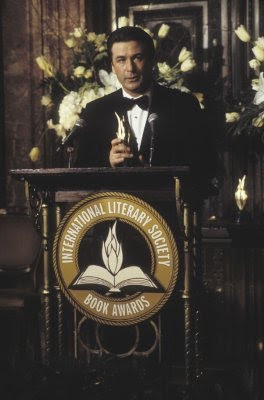
William Dieterle's "The Devil and Daniel Webster" (1941)Dieterle's classic film, based on the Stephen Vincent Benet story, by way of Archibald Macleish's stage adaptation (titled "Scratch"), gets the showcase treatment on "The Essentials," Turner's weekly movie discussion show co-hosted by Robert Osborne and Alec Baldwin. Originally released under the title "All That Money Can Buy," the film reflects on the decisions we make, as illustrated by the dealings of farmer Daniel Webster (Edward Arnold) with one Mr. Scratch (Walter Huston).
Scratch is actually ... The Devil incarnate!
Coincidentally, Baldwin himself directed a version of Benet's story in the late 1990s. With a script cowritten by novelist Peter Dexter, filmmaker Bill Condon and actress Nancy Cassaro (strange bedfellows indeed), Baldwin's "The Devil and Daniel Webster" cast Anthony Hopkins (Baldwin's co-star from David Mamet's "The Edge") as Webster and Jennifer Love Hewitt as The Devil. Apparently a troubled production from the start, the film lists no fewer than 21 producers which may explain why is was repeatedly recut and shelved, much to Baldwin's chagrin.
Ultimately acquired by Bob Yari productions, it played a couple film markets and festivals in 2004 and a few token theatrical engagements in 2007 (mostly in Europe) under the new title "Shortcut to Heaven" before going to video/DVD in 2008 - by which time, Baldwin had his directorial contribution to the film removed from its credits.
The film now lists "Harry Kirkpatrick" as its auteur.
Baldwin, however, remains on screen as the third lead, looking much thinner than he is now, as evidenced by the still shot above. He and his two stars are fine, as are the performers in the stellar supporting cast - Dan Aykroyd, Kim Cattrall, John Savage, Barry Miller, Amy Poehler, Bobby Cannavale, Jason Patric and Darrell Hammond - an indication that Baldwin is a good director of actors. Among the supporting characters in the film are Ernest Hemingway, Lillian Hellman, Charlotte Bronte, Sylvia Plath, James Joyce and Truman Capote. Dexter's contribution? Hmmm.
Stick to the original "The Devil and Daniel Webster," which airs at 8 p.m. (est) on Saturday, 28 November.
No comments:
Post a Comment